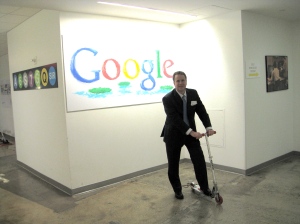 Before I share my harrowing tale, I need to tell you that I love Google. I love that it “pushes” me qualified prospects who are looking to buy. I love that it rewards those that provide helpful and valuable content. And I love that the time and effort I spend mastering Google Adwords and search engine optimization gives me a competitive advantage.
Before I share my harrowing tale, I need to tell you that I love Google. I love that it “pushes” me qualified prospects who are looking to buy. I love that it rewards those that provide helpful and valuable content. And I love that the time and effort I spend mastering Google Adwords and search engine optimization gives me a competitive advantage.
My love affair with Google is so strong that I worked for months on getting a tour of its Meat-Packing District offices for me and my Entrepreneurs’ Organization colleagues, just so I could peak behind its curtain (and of course ride a Google scooter).
With that background, you can imagine my reaction when, last Tuesday, I got a snide email from an online marketing company that’s been courting my business saying: “Hey Matt, you’ve been doing too much SEO. Look’s like Google has blacklisted you.”
Needless to say, this was not the way I wanted to start my morning.
Denial
Initially, I thought “No way, this can’t be true”. I immediately ran various searches of phrases that I “owned” the 1st or 2nd organic position, and saw that my website was no where to be found! I had almost no pages even indexed with Google (just a few obscure pages).
Anger
My initial reaction of denial changed to anger. “How could they do this to ME?”. I don’t infringe on other’s content and don’t engage in online trickery such as duplicating content, hiding text, buying links, or stuffing keywords. I had been stabbed in the back by my best friend and it wasn’t even the Ides of March.
Bargaining
My anger turned to a resolve to work this out. I’ll contact Google and make a deal. I submitted an email to help@google.com and relatively quickly got the following response: “Due to a high volume of email, we currently respond only to messages submitted through specific forms in these Help Centers.” Of course, Google doesn’t have a specific form for blacklisting or disappearing websites so this response was un-helpful.
Depression
With no one with which to bargain, I became depressed. How can my business survive without Google? I’m screwed! I might as well just close up shop. I had sent out various pleas for help but had lost all faith that their responses would help.
Acceptance
I started coming out of my depression when I realized that being blacklisted by Google apparently doesn’t affect your pay-per-click campaign. That is, while you can be removed from Google’s organic search results for violating its terms of service, Google apparently will still take your money to promote the same website via pay per click.
I’d just have to accept the idea that my Google presence would be limited to Adwords, the online version of crack (i.e., Adwords gets you high but you need to continually feed your habit to stay there). C’est la vie.
Salvation
But wait … the winds of change blew again. Like a passing storm, the sun came out and I no longer had to accept my fate. A search on Saturday morning revealed that I was back in Google’s good graces. Apparently, it was just a glitch in Google’s crawling system and when its spiders re-crawled my website, my prior organic positions were restored. My grieving was over.
They say that absence makes the heart grow fonder. Well, after just 4 days without it, my love for Google couldn’t be any stronger. I ♥ Google.
Read Full Post »
 Too often other website owners ask me to exchange links with them. They hope that multiple reciprocal exchanges with many website owners will improve their natural search engine rankings. Despite their best intentions, this strategy does not work.
Too often other website owners ask me to exchange links with them. They hope that multiple reciprocal exchanges with many website owners will improve their natural search engine rankings. Despite their best intentions, this strategy does not work.


![Reblog this post [with Zemanta]](https://i0.wp.com/img.zemanta.com/reblog_e.png)





